
The blessing of satisfaction
The bestowal of “great justification” is equal to the blessing given to “those who hunger and thirst for righteousness” among the Eight Beatitudes of Jesus. Matthew 5:6 says, “Blessed are those who hunger and thirst for righteousness, for they shall be satisfied.” Abraham’s life was one of hunger and thirst for righteousness. The blessing that was given to Abraham, who was hungry and thirsty for “righteousness,” was the blessing of “satisfaction.”
What is hunger and thirst for righteousness?
The words “hunger” and “thirst” that appear in Matthew 5:6 are both in the present participial tense in Greek. It is describing the state of being continually hungry and continually thirsty, thus conveying the meaning, “to earnestly desire.” Psalm 107:9 states, “For He has satisfied the thirsty soul, and the hungry soul He has filled with what is good.” The people of this world hunger and thirst for money, power, and pleasure however; saints must hunger and thirst for “righteousness.” Ultimately, this righteousness is Jesus Christ Himself. Romans 3:21 states, “But now apart from the Law the righteousness of God has been manifested, being witnessed by the Law and the Prophets.” This righteousness is referring to our Lord and Savior, Jesus Christ.
Spiritual satisfaction
“Satisfaction” indicates the state of being filled with fullness. Abraham always lived a life of spiritual satisfaction and fullness. Although Abraham lived his whole life as a sojourner, dwelling in tents, he was always able to live with spiritual satisfaction by looking, with hope, to the eternal home of heaven. Hebrew 11:9-10 states, “By faith he lived as an alien in the land of promise, as in a foreign land, dwelling in tents with Isaac and Jacob, fellow heirs of the same promise; for he was looking for the city which has foundations, whose architect and builder is God. Therefore, those who have experienced spiritual satisfaction have no lust of this world because they desire a better country than this world, the heaven. Abraham lived as a “stranger and sojourner” in this world (Gen 23:4; Heb 11:13). God gave Abraham “no inheritance in it not even a foot of ground” (Acts 7:5). However, having experienced spiritual satisfaction, Abraham desired a better country, that is, a heavenly one (Heb 11:16).
Physical satisfaction
Because Abraham lived a life of hunger and thirst for righteousness, God also bestowed him physical satisfaction. Abraham accumulated great possessions and acquired many people in Haran (Gen 12:5). When Abraham came out of Egypt, he was “very rich in livestock, in silver and in gold” (Gen 13:2). Abraham’s possessions were so great that he was not able to dwell together with his nephew, Lot. Genesis 13:6 states, “and the land could not sustain them while dwelling together, for their possessions were so great that they were not able to remain together.” Even at an old age, Abraham became rich because God blessed him in all things. Genesis 24:1 says, “Now Abraham was old, advanced in age; and the Lord had blessed Abraham in every way.” And Genesis 24:35 says, “The Lord has greatly blessed my master, so that he has become rich; and He has given him flocks and herds, and silver and gold, and servants and maids, and camels and donkeys.”
God who satisfies us
Today, when we live a life of hunger and thirst in the world, striving to reach the “righteousness” of God only, God will surely satisfy us both spiritually and physically. Matthew 6:33 says, “But seek first His kingdom and His righteousness, and all these things will be added to you” and Philippians 4:19 says, “And my God will supply all your needs according to His riches in glory in Christ Jesus.”
Conclusion: Just as Abraham, the Father of faith hungered and thirsted for righteousness, let us also have this same desire. Let us draw near to Him that we may receive “great justification” and be filled with the goodness of God which is Jesus Christ. Let us praise and lift up our hands in your name so that our soul is satisfied and with our mouths offer praises with our lips (Psa 63:4-5).
 [Read] Logos Meditation
[Read] Logos Meditation
 [Read] The Fulfillment of the Prophecy Regarding Abraham (GEN...
[Read] The Fulfillment of the Prophecy Regarding Abraham (GEN...









